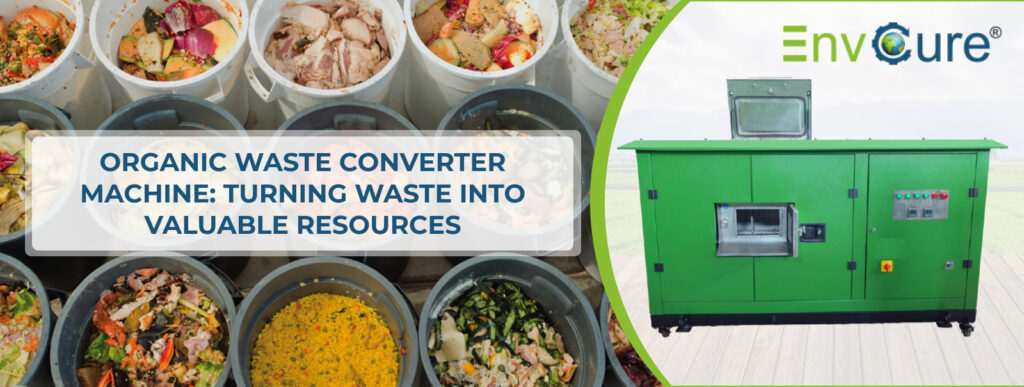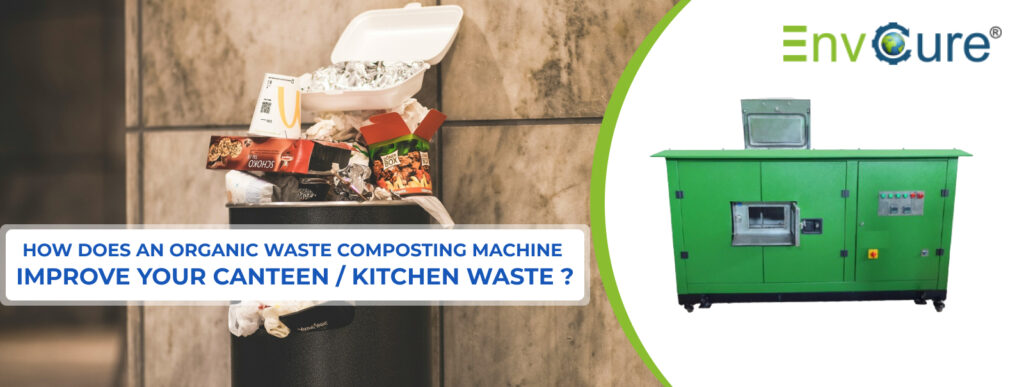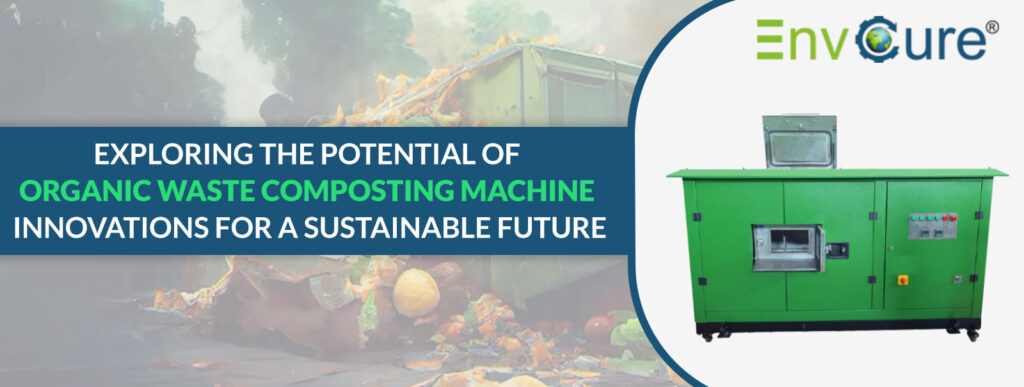Annually, a staggering 1.3 billion tonnes of food are lost or wasted globally, intensifying hunger crises and contributing significantly to environmental degradation (UNEP – UN Environment Programme). Food waste not only wastes precious resources but also generates about 8-10% of global greenhouse gas emissions, speeding up climate change.
In the face of escalating environmental concerns, the role of organic waste composting machines in mitigating our ecological footprint and fostering conservation efforts cannot be overstated. These innovative machines offer a sustainable solution to managing organic waste, transforming it into valuable compost and, in turn, bolstering environmental health.
The Environmental Impact of Organic Waste
Why should the conversation about organic waste and its management be at the forefront of our environmental agenda? The statistics are compelling; more than one-third of food produced globally is either lost or wasted. This isn’t just a staggering economic loss; it’s a significant environmental hazard. Organic waste in landfills decomposes anaerobically, releasing methane, a greenhouse gas far more potent than carbon dioxide, into the atmosphere. This exacerbates the greenhouse effect, contributing significantly to global warming and climate change.
Considerations for Reducing Organic Waste:
- Plan your meals to avoid overbuying and wasting food.
- Donate surplus food to food banks or shelters to help those in need while reducing waste.
- Compost food scraps at home or participate in community composting program
How Organic Waste Composting Machines Work
Have you ever wondered what happens inside an organic waste composting machine? These marvels of modern engineering accelerate the natural composting process, transforming your food scraps and garden waste into nutrient-rich compost in a fraction of the time it would take in a traditional compost pile.
The Process Simplified:
- Addition of Organic Waste: Food scraps, yard waste, and other organic materials are added to the machine.
- Acceleration: The machine creates the perfect conditions of heat, moisture, and aeration to speed up the decomposition process.
- Transformation: Over time, these materials break down into compost that can enrich soil and support plant growth.
Key Benefits:
- Fast and efficient: Reduces the composting process from months to just weeks.
- Odor control: Keeps the composting process contained and odor-free.
- High-quality compost: Produces nutrient-rich compost that’s beneficial for your garden.
Implementing Composting in Your Community
Introducing composting on a community scale can seem daunting, but with strategic planning and community engagement, it can become a seamless part of local waste management strategies. Organic waste composting machines can be crucial in these efforts, providing a sustainable pathway for waste reduction and resource recovery.
Steps to Foster Community Composting:
- Engagement: Start by raising awareness about the benefits of composting and gauging community interest.
- Partnerships: Collaborate with local businesses, schools, and municipal governments to secure funding and support.
- Infrastructure: Invest in scalable composting machines that can handle the volume of waste your community produces.
- Education: Offer workshops and resources to educate residents on how to compost effectively and why it matters.
Dos and Don’ts for Effective Community Composting:
- Encourage participation through incentives and easy access to composting facilities.
- Don’t underestimate the importance of ongoing education and support to maintain engagement.
- To celebrate successes and share the impact of composting on waste reduction and soil health with the community.
Optimizing Compost Use in Agriculture
As we pivot towards a more sustainable approach in agriculture, the role of compost has never been more critical. Enriched with nutrients, compost revitalizes depleted soils and promotes healthier plant growth, reducing the need for chemical fertilizers. The question, however, remains: How can we best utilize this black gold in our agricultural practices?
Tips for Incorporating Compost into Farming:
- Test your soil to understand its specific nutrient needs and tailor your compost application accordingly.
- Apply compost at the right time: For annual crops, mix compost into the soil before planting. For perennial crops, the end of the season might be optimal.
- Monitor compost quality: Ensure the compost is fully decomposed and free from pathogens or weed seeds to avoid spreading issues to your fields.
Things to consider:
- The type of crops you’re growing, as different plants have varying nutrient requirements.
- The existing soil health and structure in your fields, to determine the right amount and type of compost needed.
- Local regulations regarding compost application, to ensure compliance and environmental protection.
Environmental Impact and Sustainability
The adoption of organic waste composting machines significantly propels our efforts towards environmental sustainability. These machines tackle the vast quantities of organic waste generated daily by efficiently converting them into compost. This process not only diverts waste from landfills, where organic matter would decompose anaerobically to produce methane—a potent greenhouse gas—but also substantially reduces greenhouse gas emissions.
The conversion of organic waste into compost has a dual benefit; it mitigates the volume of waste headed for landfills and concurrently minimizes the environmental degradation linked to landfill sites. Moreover, the compost produced enriches the soil, negating the need for chemical fertilizers and fostering a cycle of natural, sustainable growth. This transformation supports a broader vision of environmental conservation, highlighting the indispensable role of organic waste composting machines in fostering a sustainable future (UNEP – UN Environment Programme)
Innovations by EnvCure
EnvCure stands at the forefront of this technological revolution, offering state-of-the-art fully-automatic organic waste to composting machines. These machines are not just efficient and user-friendly but also embody the principles of sustainability and environmental stewardship, making them an ideal choice for businesses and communities alike.
Conclusion: The Role of EnvCure
Companies like EnvCure play a crucial role. By embracing and promoting the use of organic waste composting machines, EnvCure not only demonstrates a commitment to sustainability but also leads by example in the global fight against climate change and waste proliferation. Together, we can make a significant impact on our planet’s health, one compost pile at a time.
By focusing on solutions like food waste composting machines for home, we not only address the issue of waste but also contribute to the health of our planet. It’s a journey of transformation, where waste becomes a resource, and every step taken is a stride towards a greener, more sustainable world.
For more information on how composting can aid in solving the climate challenge and its benefits, including reducing carbon emissions and enhancing soil productivity, please refer to the studies and discussions on websites like the United Nations Environment Programme (UNEP), S.C.R.A.P. lab, and the NRDC (UNEP – UN Environment Programme) (S.C.R.A.P. lab) (NRDC).
Frequently Asked Questions:
Q.1. How do organic waste composting machines help reduce footprints?
Ans: Organic waste composting machines break down biodegradable waste into nutrient-rich compost, reducing landfill waste and methane emissions.
Q.2. Can composting machines handle all types of organic waste?
Ans: Most composting machines can process a wide range of organic materials, including food scraps, yard waste, and biodegradable packaging.
Q.3. What environmental benefits do composting machines offer?
Ans: Composting machines promote recycling, minimize greenhouse gases, enrich soil health, and conserve natural resources by diverting organic waste from landfills.








